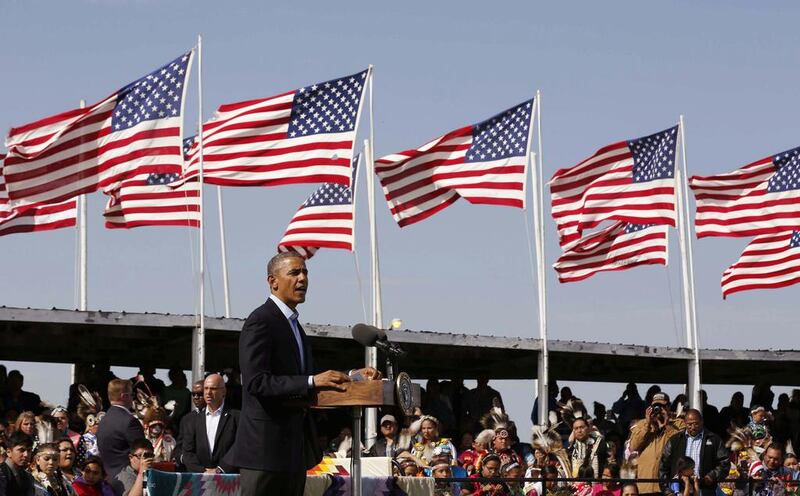NEW YORK // The crisis in Iraq has presented Barack Obama with a dilemma: how to pressure Iraqi prime minister Nouri Al Maliki towards inclusive rule without driving Baghdad closer to Tehran.
Mr Obama said US military action in Iraq, including possible air strikes, was contingent on concrete steps by Mr Al Maliki to address the long-festering sectarian strife underlying the crisis.
But the US president needs to calibrate that message with the reality that it may push Mr Al Maliki to increase cooperation with Iran and Shiite Islamist militias, which US officials fear would inflame the sectarian and ethnic forces pulling Iraq apart.
The US also wants to avoid the perception it is helping reinforce Mr Al Maliki’s authoritarian rule and sectarian policies that have allowed militants to regain a foothold in Sunni Arab areas, analysts say.
Military assistance “has to be joined by a serious and sincere effort by Iraq’s leaders to set aside sectarian differences, to promote stability, and account for the legitimate interests of all of Iraq’s communities and to continue to build the capacity of an effective security force,” Mr Obama said on Friday. “We can’t do it for them.”
Since an alliance of Sunni militant groups led by the Islamic State of Iraq and the Levant (ISIL) began seizing control of cities on Tuesday, the US has stepped up surveillance drone flights to gather intelligence to share with Iraqi officials, State Department spokeswoman Marie Harf said.
The only option Mr Obama ruled out was US ground forces.
The Obama administration has long pushed Mr Al Maliki and other Iraqi political elites to incorporate the interests of Sunni Arabs, but instead he has alienated minorities further by increasing his control and putting off devolution and reforms.
But Mr Al Maliki, who was reelected for a third term last month, has never faced an existential threat such as this, and US officials think now may be the moment when those political compromises are finally struck, with a first step perhaps being the formation of a unity government, said Brian Katulis, a senior fellow at the Centre for American Progress, a think tank close to the US administration.
So far, however, there have been few steps toward political reconciliation while the spectre has grown of sectarian war of the kind that tore the country apart from 2005 to 2008. Thousands of young men have flocked to volunteer for a number of Shia militias after Grand Ayatollah Ali Al Sistani’s plea for men to help fight and support government forces.
ISIL, which considers Shiites to be apostates deserving of death, said it planned to attack the Shiite shrine cities of Karbala and Najaf to “wipe away the filth”.
ISIL, an Al Qaeda offshoot, has exploited Sunni anger over brutal treatment by Shiite-dominated security forces and exclusionary policies that have completely reversed the gains of the US Awakening strategy that turned Sunni tribal fighters against Al Qaeda in 2007.
Reports that Major General Qassem Suleimani, the leader of the Iranian Revolutionary Guard’s Quds Force, which conducts Tehran’s regional operations, is in Baghdad advising Iraqi security forces underlined US concerns that Iran could play a larger role in the growing sectarian conflict.
“It’s not hard to imagine the Iraqi government … turning to somebody [to help fight the militants] who has a proven track record of protecting their allies, and that’s the Iranians”, said Michael Knights, a fellow at the Washington Institute for Near East Policy think tank specialising in Iraq’s military and security affairs.
Mr Knights said he spoke to senior Iraqi officials in Baghdad in March who told him that “the Iraqi government feels it needs to use some of the same formula that [Syrian President Bashar] Al Assad” deployed to help put down the Sunni militants, referring to the Iranian military advisers and Shia Islamist militias who were essential in turning the tide of battle against rebels there.
The danger of the conflict becoming one between ISIL-led Sunni insurgents and Shiite militias would stoke a sectarian conflagration in a region already pushed to the brink by the war in Syria and the Saudi-Iran rivalry.
“The US concern is to make sure Iran doesn’t play a role that further accelerates sectarian conflict,” said Mr Katulis. “The US is going to carefully calibrate its response according to what the Iraqi government does, and I think that’s one thing they’re looking at carefully.”
Other analysts said the US will use force if ISIL appears able to attack Baghdad — even if Mr Al Maliki shows no sign of changing his policy.
According to Mr Knights, the US is “getting ready to offer ‘final defensive fire’ with air power if the Iraqi government needs it around the government centre and main highways converging on Baghdad”.
He added that while air strikes would not be a panacea in defeating ISIL, they could provide an important morale boost to Iraqi forces. Thousands have deserted in recent months, and ISIL was able to take Mosul with little fighting as Iraqi soldiers and police fled.
“The US understands that Maliki has two options: US help, or Iranian help,” said Faysal Itani, a resident fellow at the Rafik Hariri Centre for the Middle East at the Atlantic Council think tank.
“Therefore, the priority will be to stabilise the security situation — all talk of reform is meaningless before that.”
There is also the possibility that both Tehran and Washington will provide support to Baghdad, which has few other allies, and that the long-time adversaries will find themselves in indirect alliance.
On Saturday, Iran’s president Hassan Rouhani said Tehran was prepared to consider working with the US in Iraq.
“If we see that the United States takes action against terrorist groups in Iraq, then one can think about it,” Mr Rouhani said.
tkhan@thenational.ae





